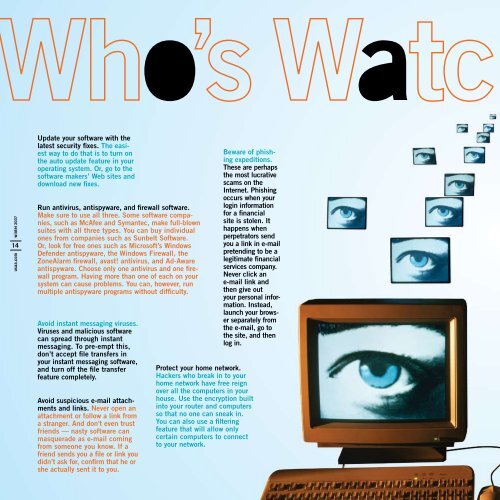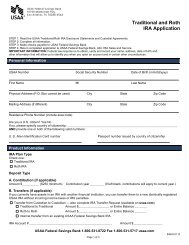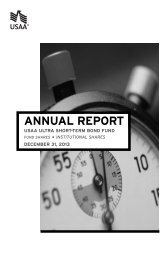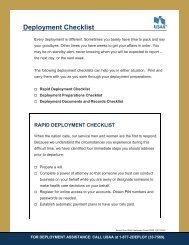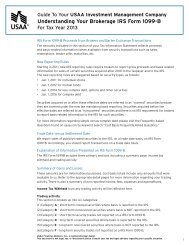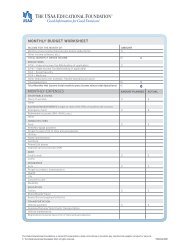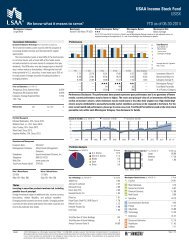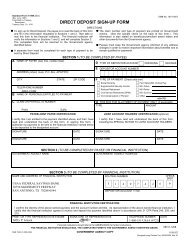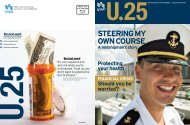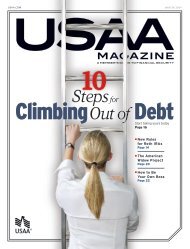You also want an ePaper? Increase the reach of your titles
YUMPU automatically turns print PDFs into web optimized ePapers that Google loves.
winter <strong>2007</strong><br />
14<br />
usaa.<strong>com</strong><br />
Update your software with the<br />
latest security fixes. The easiest<br />
way to do that is to turn on<br />
the auto update feature in your<br />
operating system. Or, go to the<br />
software makers’ Web sites and<br />
download new fixes.<br />
Run antivirus, antispyware, and firewall software.<br />
Make sure to use all three. Some software <strong>com</strong>panies,<br />
such as McAfee and Symantec, make full-blown<br />
suites with all three types. You can buy individual<br />
ones from <strong>com</strong>panies such as Sunbelt Software.<br />
Or, look for free ones such as Microsoft’s Windows<br />
Defender antispyware, the Windows Firewall, the<br />
ZoneAlarm firewall, avast! antivirus, and Ad-Aware<br />
antispyware. Choose only one antivirus and one firewall<br />
program. Having more than one of each on your<br />
system can cause problems. You can, however, run<br />
multiple antispyware programs without difficulty.<br />
Avoid instant messaging viruses.<br />
Viruses and malicious software<br />
can spread through instant<br />
messaging. To pre-empt this,<br />
don’t accept file transfers in<br />
your instant messaging software,<br />
and turn off the file transfer<br />
feature <strong>com</strong>pletely.<br />
Avoid suspicious e-mail attachments<br />
and links. Never open an<br />
attachment or follow a link from<br />
a stranger. And don't even trust<br />
friends — nasty software can<br />
masquerade as e-mail <strong>com</strong>ing<br />
from someone you know. If a<br />
friend sends you a file or link you<br />
didn’t ask for, confirm that he or<br />
she actually sent it to you.<br />
Beware of phishing<br />
expeditions.<br />
These are perhaps<br />
the most lucrative<br />
scams on the<br />
Internet. Phishing<br />
occurs when your<br />
login information<br />
for a financial<br />
site is stolen. It<br />
happens when<br />
perpetrators send<br />
you a link in e-mail<br />
pretending to be a<br />
legitimate financial<br />
services <strong>com</strong>pany.<br />
Never click an<br />
e-mail link and<br />
then give out<br />
your personal information.<br />
Instead,<br />
launch your browser<br />
separately from<br />
the e-mail, go to<br />
the site, and then<br />
log in.<br />
Protect your home network.<br />
Hackers who break in to your<br />
home network have free reign<br />
over all the <strong>com</strong>puters in your<br />
house. Use the encryption built<br />
into your router and <strong>com</strong>puters<br />
so that no one can sneak in.<br />
You can also use a filtering<br />
feature that will allow only<br />
certain <strong>com</strong>puters to connect<br />
to your network.


